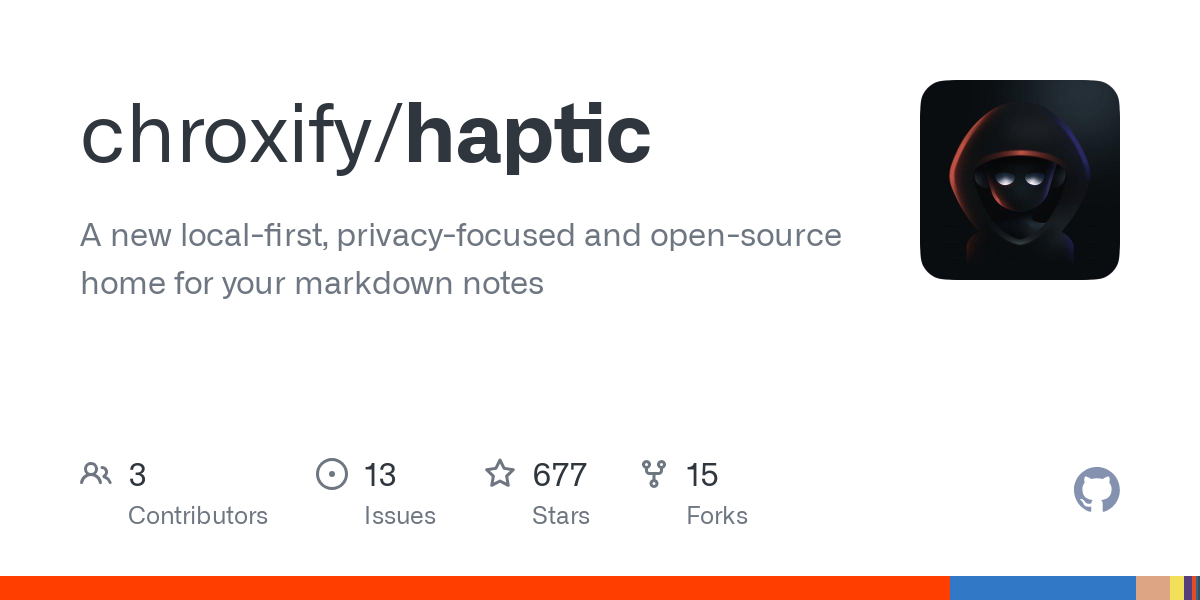This seems like a solid choice for those of use looking for a obsidian-like replacement. Personally tried all editors out there, but nothing is able to defeat my love for obsidian. However, i look forwards to trying out Haptic when it comes to Linux. Currently it only supports Web and Mac. But state Linux and Windows support is on-the-way.
Kudos to selfh.st that provides consistent updates within this community and who shared this among other cool projects this week -> https://selfh.st/newsletter/2024-09-06/?ref=this-week-in-self-hosted-newsletter



I tried every single proprietary and open source , even self host , markdown notes apps. Obsidian is … just, i always go back to it. I have it with the plugin “Remotely Save”, synced encrypted with OneDrive. It just works, every fucking where with its own app. solid as a petrified dump
I’m early onto my journey with this and tossing between logseq and obsidian. Thoughts?
Logseq and Obsidian are only similar on the first look, but very different usage wise. Both are very open with a plugin system, and you can modify them to turn them into one eachother.
So, if you want only FOSS, then Logseq is the only choices you have.
But Obsidian is, even though it’s proprietary, very sane. Open plug-in system, active community, great devs who don’t have much against FOSS, and more.
Obsidian
Logseq
This is really helpful, thank you. I’ve made a start with Logseq but I think I’ll try Obsidian and migrate my notes across. I’m definitely a structured guy.
Obsidian is just sooooo good. I hate that you (technically 😉) have to pay for multi device sync, but the UI and UX are excellent, especially if you’re already proficient in markdown
Haven’t tried logseq before, so I can’t compare
How else do you get multi device sync?
My current solution is to use syncthing to handle syncing the files, but I have to debug a permissions error that pops up.
I have my workspace in Google drive synced folder and it’s worked fine.
See me comment above
https://lemmy.ca/comment/11490137
I don’t like that obsidian not fully open source but the plugins can’t be beat if you use them. Check out some youtube videos for top 20 plugins etc. Takes the app to a whole new level.
You need to list out your requirements. What do you want to do? Where do you need your data? Do you care about open source? Self-hosting? Do you have an idea how your content will be organized? Will you ever need to tap into it as data? Etc
I have notes fairly sporadically all over the place. Some for work for compartmentalised projects that I won’t need to see again once the project is done. Then for personal creative projects. Then for personal research projects. I like tracking data for sure. I’d prefer to have one central place for everything. I like things organised and get very into organisation but I’d love some kind of AI organisation element. Not sure either of these do that though. I do have my own server and like self hosting. I do care about foss but will sometimes choose a more appropriate tool over a foss one. I need the data on my phone and accessible either on a cloud or syncable or something. I’m currently dipping my toe into Obsidian with syncthing/Dropbox. I won’t pay for any monthly fees but don’t mind paying one off payments.
I think you should give Trilium(Next) Notes a try:
it has the hierarchical notes structure that you are familiar with in obsidian
it has better ways of keeping things organized (attributes can be values or references, can be shared and inherited, which provides a flexible framework for having notes “types” as templates that can be extended, e.g. people vs. colleagues, businesses vs. companies, etc)
it has the concept of note hoisting (which lets you focus on a note and its sub-notes, so other projects/spaces don’t come in the way of autocomplete and placing references), and workspaces that builds further on top of that
it can be used standalone (local client/offline-only, like obsidian) but coupling it with a remote-server opens more interesting use-cases (synching, sharing notes with others by public URLs, one-user/multi-client editing) which gives the best of both worlds (local-first/online-first) and lets you access your personal notes on devices you don’t necessarily own (which obsidian doesn’t). The mobile app story isn’t great (it’s a PWA with limited offline capabilities at the moment), but isn’t worse than the alternatives either (I can’t really work and think long form on a handheld, no matter the editor experience, but perhaps that’s just me).
Iiiinteresting, I’ll give it a spin, thank you for the recco!
I don’t see any problems with that. Even I (and probably most others here), who are FOSS advocates, think Obsidian’s model is fine.
The devs surely get why FOSS is important, and try their best to match the pros of open source. They even stated that if the company goes bankrupt or they stop developing the app, they’ll open source it.
One major thing they do absolutely right is how the notes get stored. On other note taking apps, it’s a proprietary database, often “in the cloud”, where your notes get hold hostage. Here, they’re just Markdown files, and the whole thing is pretty open, encouraging a strong community.
It’s similar to Valve/ Steam. Proprietary, but liked by most Linux people.
Have you tried trilium notes? Not as hyped and polished, but does extraordinarily well IME.
I feel ya on this one… its magically good.